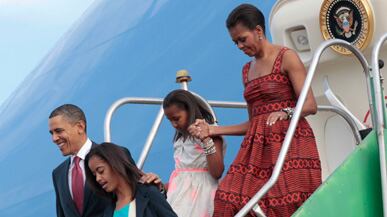With Japan and the Middle East in turmoil, critics are blasting Obama's Latin America tour as ill-timed—but the economic recovery could depend on it. Mac Margolis reports from Brazil
With the nuclear emergency in Japan, much of the Middle East in turmoil, and a near budget meltdown in the United States Congress, President Barack Obama’s decision to spend a week in Latin America might seem ill advised. Air Force One was already on the ground in Brazil when the first rebel jet was downed in the Libyan no-fly zone earlier today. And yet, Obama never wavered.
Photos: President Obama Visits Brazil

Starting today, when he meets with Brazilian president Dilma Rousseff, Obama kicks off a three-country, four-city swing of a region that has long been on Washington’s to-do list but rarely as a diplomatic priority. That may be changing. In a trip that will take him to Brazil, with visits to Brasilia and Rio de Janeiro, then Chile and finally El Salvador, Obama will find a chunk of the world that, with few exceptions, is stable, prosperous, friendly, and solidly democratic. A region that was once a chronic trouble spot in the international economy is now seen as a solution, courted by investors, its leaders suddenly on every dance card.
At a time when global markets are still struggling, Latin America may be one of the few sources of good news for recovering U.S. economy and a rare opportunity to tap new alliances. Thanks to close to two decades of economic reforms that tamed inflation, stanched populist spending, and opened markets to global completion, most of Latin America weathered the global financial crisis unscathed and was one of the first regions of the world to emerge from recession. The region is set to grow by more than 4 percent this year. Brazil, the regional powerhouse, grew 7.5 percent last year. Every $1 billion dollars the U.S. exports to Latin America represents 5,000 jobs in America. “The impressive growth that we've seen in Latin America in recent years is good for the people of the hemisphere, and it's good for us,” Obama wrote in Friday’s USA Today.
Others also have noticed. While the U.S. has been distracted by war in Afghanistan and emergencies in the Middle East, China has moved quietly into Latin America, buying up not just commodities like soy beans and iron ore but scooping up major stakes in Latin mines, farms, refineries, and ports. China is now the biggest importer of Latin American goods, buying $44 billion in 2009, against $5 billion in 2000. It recently overtook the U.S. to become Brazil’s and Chile’s largest trading partner, and will likely trump the EU in the region by 2015.
Though Beijing’s interest in Latin America is solely economic, its growing footprint in a region the U.S. considered - archly at times - its own backyard is jolting. Adding to the slight, Colombian president Juan Manuel Santos, frustrated over Washington’s failure to ratify a bilateral free trade agreement with the U.S., recently announced he was in “advanced” talks with the Chinese over building a cross-country railway from the Caribbean coast to the Pacific to haul coal and other commodities bound for China. The projects nickname, tellingly, is the “dry Panama Canal.”
In many ways, Obama’s road to recovery in Latin America starts in Brazil. With a $2 trillion economy, a burgeoning middle class eager to hit the mall, and a huge cache of sweet crude oil lying off the shore of the Atlantic, this regional powerhouse is on a roll. The two ranking nations in the hemisphere have maintained cordial relations over the years, but the mood soured when then-president Luiz Inácio Lula da Silva put Brazil’s normally even-handed foreign policy on steroids, opening dozens of embassies in third world countries, blaming the financial crisis on “blue-eyed blonds,” and cozying to autocrats in Iran, Cuba, and Venezuela.
Rousseff, Lula’s handpicked successor, is not likely to reverse Brazilian foreign policy. (Brazil abstained on the U.N.’s Libya no-fly zone resolution.) Neither is she likely to stoke the flames. A onetime Marxist revolutionary who was jailed and brutally tortured under the Brazilian dictatorship, she has gone on record condemning human rights abuses in Iran. Like many onetime Latin leftists, she made the transition from rebel to bureaucrat, and earned a reputation as a technocrat.
In that way, Rousseff is an emblem of Latin America transformed, a region of solid if flawed democracies and prudent fiscal policies, where wonks have replaced firebrands and interests trump ideology. Critics fault Obama for a trip that will produce no new treaty and no bold policy initiative for the region. Forget the Latin wish-list of striking down farm subsidies and trade barriers that hobble ethanol, beef, and coffee, and never mind Brazil’s claim to a permanent seat on the U.N. Security Council. The embattled Democrat has neither the prestige nor the votes in Congress to push those hot buttons. But in a way, his visit is confirmation of a region on the rise.
Photos: Obama Family Trips

Brazil, Chile, and El Salvador couldn’t be more different. Yet they are similar in key ways. Brazil is a giant, with global ambitions. Modest Chile is an example of sound governance and a working pact between parties of the left, center, and right. Tiny, impoverished El Salvador survived a civil war and restored a vibrant democracy. All three countries have shown resilience and a pragmatic streak that point to something new blowing south of the Florida straits.
For all their grumblings over gringo attention deficit,, Latin Americans remain remarkably enthusiastic over their neighbor to the north. Some 68 percent of Colombians, 67 of Chileans and 55 percent of Brazilians say Obama is doing a good job, according to a recent Gallup poll. That’s the sort of political capital that ought to focus minds, even in Washington.
A longtime correspondent for Newsweek, Mac Margolis has traveled extensively in Brazil and Latin America. He has contributed to The Economist, The Washington Post, and The Christian Science Monitor, and is the author of The Last New World: The Conquest of the Amazon Frontier.






